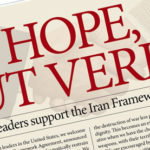(ABP) — Alaska Gov. Sarah Palin's answer during her Oct. 2 vice-presidential debate expressing support for a “two-state” solution to the Israeli-Palestinian conflict is drawing criticism from some of her strongest supporters — pro-Israel conservative Christians.
"A two-state solution is the solution," the GOP vice-presidential candidate said, expressing support for President Bush’s plan.
That answer put her at odds with some Christian Zionists like San Antonio-based pastor and evangelist John Hagee, who is on record as opposing the Bush administration's proposed "roadmap for peace" or any other solution that causes Israel to cede land. Based on his reading of Bible prophecy, Hagee has predicted that God would punish the United States for asking Israel to exchange land for peace. Such punishment, Hagee has asserted, would come through terrorist attacks.
Hagee was one of the first Religious Right supporters of Palin’s running mate, Sen. John McCain, in his presidential bid. McCain later rejected Hagee's endorsement after controversy erupted over previous references the TV preacher had made to Hitler and the Holocaust. Before that, however, the Arizona senator appeared in at Hagee's Christians United for Israel gathering in 2007 to declare himself a Christian and "proudly pro-Israel."
Top-of-an-agenda item
Palin, an evangelical Christian who reportedly displays an Israeli flag in her governor's office in Juneau — even though she has never been to the country — said during the debate that brokering peace in Israel would be a "top-of-an-agenda item" under a McCain-Palin administration.
While largely overlooked by the mainstream media, that comment jumped out for Christian Zionist blogs. The Amerisrael blog called Palin’s words "deeply troubling and disturbing" and said they "could cost McCain valuable votes."
Another blog — Jerusalem Watchman — called Palin's proposal "nothing less than a total betrayal of Israel" and predicted that, "unless they are repented from," following through with those views "will fundamentally and detrimentally affect the national history of the United States."
Blog Amy J’s Worldview, which describes itself as coming “from a conservative Christian point of view,” said, "The land that the Palestinians want as their state is the land that God gave to the Israelites several thousands of years ago.”
Sign up for our weekly edition and get all our headlines in your inbox on Thursdays
The post continued, “Sarah Palin should know this and she should know the consequences of taking away the God-given lands from Israel."
Nuanced response
Not all pro-Israel Christians responded so harshly, however.
Michael Hines, the U.S. media director for International Christian Embassy Jerusalem, called Palin's answer "a very nuanced response" that suggested "a lot of knowledge on the issue."
Hines, who lived in Israel five years, said "everyone arrives in Israel as an expert," but when they leave they aren't so sure about easy answers. He noted that a two-state solution is also the position advocated by Israel's government.
"If you say you love Israel, you've got to give it the right to make its own sovereign decisions," he said in an interview. "You can't love Israel more than Israelis."
Embassy in Jerusalem
Hines also gave Palin high marks for repeating an earlier pledge by McCain to move the U.S. embassy in Israel from Tel Aviv, where it has been since the creation of Israel, to Jerusalem — a move that would likely inflame Palestinians.
A 1980 United Nations Security Council resolution called on all nations to withdraw their embassies from Jerusalem in a censure of Israel's acquisition of territory by force.
Congress enacted legislation in 1995 calling for the United States to move its embassy to Jerusalem, but the president can postpone the move every six months based on national security interests. President Bush last exercised the waiver June 4.
Churches for Middle East Peace, a mainline group of Orthodox, Catholic and Protestant U.S. religious bodies, says Jerusalem should remain a "final-status issue" to be determined in future negotiations between Israel and Palestine. Unilaterally moving the U.S. embassy to Jerusalem now, they said, would pre-empt those talks.
Hines said recent candidates in both parties have promised, while running for president, to move the embassy — but continued to postpone the move after taking office. Based on McCain's voting record as a senator, Hines said that might change.
"I think he might actually be the president who would make a difference on that."
"Overly informed by Christian apocalyptic theology"
Howard Bess, a retired progressive American Baptist pastor in Palmer, Alaska, who has known Palin for years and battled against her churches in local culture-war issues like women's access to abortion and selection of library books, noted with interest that Palin described having an embassy in Jerusalem as a top priority.
"I suspect that her thinking is overly informed by Christian apocalyptic theology," Bess said in an e-mail interview. "Jerusalem is not the center of the world."
Bess, who has been interviewed about his clashes with Palin's forces by Salon.com and ABC News, said he has encouraged the media to "take a hard look" at Palin's churches and how their end-times theology might influence her thinking on foreign policy.
Asked during the debate whether a nuclear Pakistan or Iran posed a greater threat, Palin said both are "extremely dangerous."
"An armed — nuclear-armed, especially — Iran is so extremely dangerous to consider," she said. "They cannot be allowed to acquire nuclear weapons period. Israel is in jeopardy, of course, when we're dealing with [Mahmoud] Ahmadinejad as a leader of Iran. Iran claiming that Israel [is] as he termed it, a ‘stinking corpse,’ a country that should be wiped off the face of the earth."
Some evangelicals believe a nuclear war involving Israel and Iran is prophesied in the Old Testament book of Ezekiel.
Christian Broadcasting Network founder and former presidential candidate Pat Robertson says in a new letter on his Web site, PatRobertson.com, that he believes between 75 and 120 days remain before the Middle East "starts spinning out of control."
He called on supporters to pray that God would "change the hearts of the leaders of Russia and Iran" to save Israel. "Hopefully, our Lord will intervene and head off the disaster that seems to be approaching," Robertson wrote.
Hines, of the International Christian Embassy, said Palin's debate opponent, Sen. Joe Biden (D-Del.), is "probably the most knowledgeable and experienced senator on international affairs," but "knowledge isn't everything." He said he is more interested in a candidate's "worldview" and "moral/philosophical understanding" in determining U.S. Mideast policy.
Hines’ organization — a non-governmental group — recently delivered a petition signed by 55,000 Christians from around the world asking the U.N. to indict Iranian leaders for incitement to genocide against Israel.
The U.S. House of Representatives passed a resolution supporting the petition, but it is being held up in the Senate Foreign Relations Committee, which Biden chairs.
Hines said that while his organization is a tax-exempt non-profit agency that doesn't endorse candidates, "I take some issues with [Biden's] claim that he's Israel's best friend in the Senate."
Read more
VP debate explores little on hot-button social issues (10/3)














We seek to connect God’s story and God’s people around the world. To learn more about God’s story, click here.
Send comments and feedback to Eric Black, our editor. For comments to be published, please specify “letter to the editor.” Maximum length for publication is 300 words.